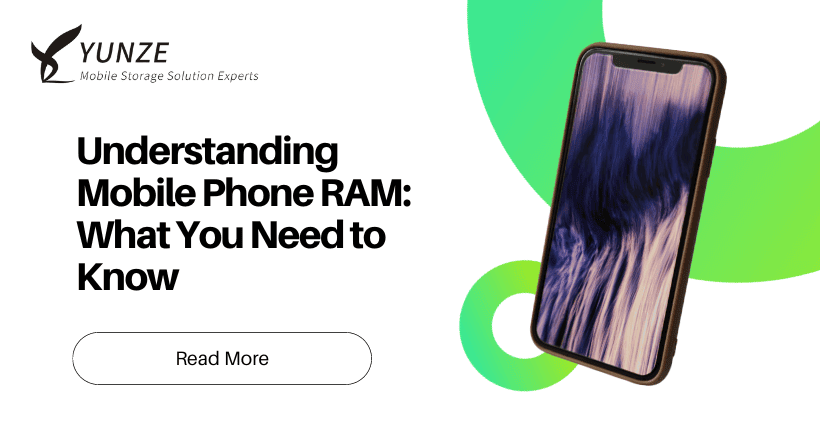When it comes to buying a mobile phone, many people seem to understand, but not quite. You can say they don’t understand, but they do get it a little. But if you say they all understand, a lot of people still can’t distinguish between RAM and internal storage memory even now.
We’ve all been there. A friend complained about their phone being slow, and when asked about the RAM, they mentioned a baffling number like 128GB. It’s a common misconception, but the confusion between RAM (Random Access Memory) and internal storage memory is understandable. In this article, we’ll unravel this tech mystery and delve into why RAM is a vital factor when choosing a mobile phone.
1. The Role of RAM
Your phone’s RAM is crucial. It’s the digital workspace that allows your device to perform tasks, run apps, and handle data. The more RAM your phone has, the more efficiently it can handle these operations. Think of it as your device’s short-term memory.
2. RAM and Responsiveness
The amount of RAM directly impacts your phone’s responsiveness. If your phone’s RAM can’t keep up with the demands, it results in slower performance and, in some cases, even freezing or crashing of apps. Therefore, it’s essential to pay attention to RAM when choosing a phone.
3. Recommended RAM for Android Phones
For Android users, it’s advisable to opt for a phone with 8GB of RAM or more. As Android software evolves and games become more demanding, having ample RAM ensures your phone remains snappy and responsive. Currently, many mainstream Android phones offer between 12GB and 16GB of RAM.
4. Apple’s Approach to RAM
Apple, with its iOS system, has strict memory management. iOS is efficient, consuming less background memory. Even with its rigorous control, most iPhones feature 4GB or 6GB of RAM. This is because iOS is more streamlined, and Apple optimizes its software to run efficiently with less RAM.
5. The Influence of Android’s Open-Source Nature
Android, on the other hand, is open-source, granting manufacturers and developers more control. While this openness fosters innovation, it also leads to Android software becoming more extensive and resource-intensive over time. If you are an Android user who enjoys gaming or handles high-performance tasks, it’s best to start with a minimum of 8GB of RAM.
6. Constant Evolution of Software and Games
Software and games on both Android and iOS update every year, often raising their RAM requirements. What seems sufficient one year may become sluggish the next. This is why it’s wise to future-proof your phone by choosing a model with ample RAM.
7. A Friendly Recommendation
In conclusion, here’s some friendly advice. If you’re an Android user with high demands, particularly for gaming or resource-intensive tasks, steer clear of phones with less than 8GB of RAM. For Apple device enthusiasts, it’s wise not to opt for a phone with less than 6GB of RAM. Even though iOS is efficient, the need for RAM grows with each software update.
Different users have different needs, and RAM requirements vary. However, for most users, we recommend not choosing a phone with less than 8GB of RAM for Android and 6GB for Apple devices. Remember, investing in sufficient RAM ensures your phone stays relevant and responsive for years to come.
8. Frequently Asked Questions (FAQs)
1. What’s the minimum RAM I should consider for casual smartphone usage?
For everyday use, 4GB to 6GB of RAM is generally sufficient. However, considering the evolving demands of software and apps, more RAM is advisable for a smoother experience.
2. Do iPhones require less RAM than Android phones?
Yes, iPhones typically require less RAM due to their efficient iOS system. Most iPhones come with 4GB to 6GB of RAM, which is ample for their needs.
3. Are there smartphones with 32GB of RAM available?
While 32GB of RAM smartphones are on the horizon, they are not mainstream yet. These are generally targeted at users with extremely high-performance needs.
4. Can I upgrade my smartphone’s RAM later?
No, most smartphones do not allow RAM upgrades. You must choose a device with the desired RAM capacity when making your purchase.
5. What are the key factors besides RAM to consider when buying a smartphone?
In addition to RAM, you should consider the processor, camera quality, battery life, and operating system. Your choice should align with your specific needs and preferences.
Now that you have a clearer understanding of the importance of RAM in your mobile phone, make an informed choice when you’re due for an upgrade. Don’t let your phone’s performance be hindered by inadequate RAM; invest in a model that suits your needs.

Recommended:



